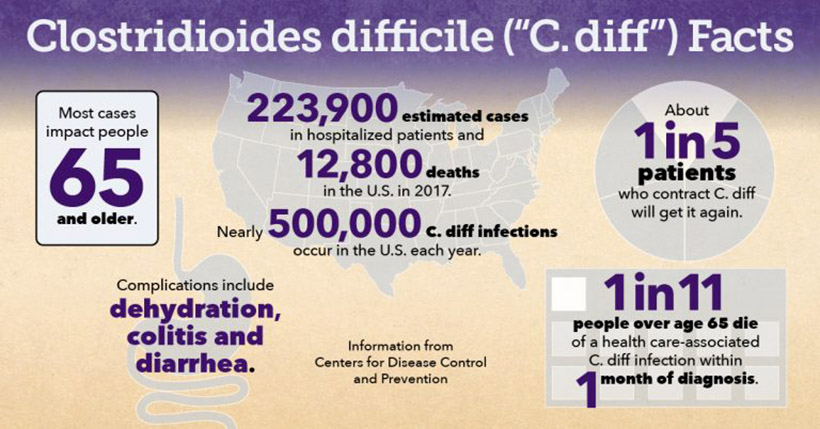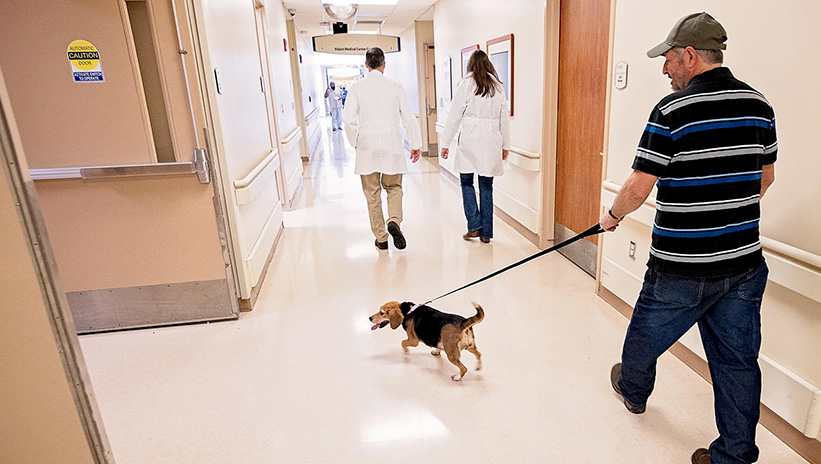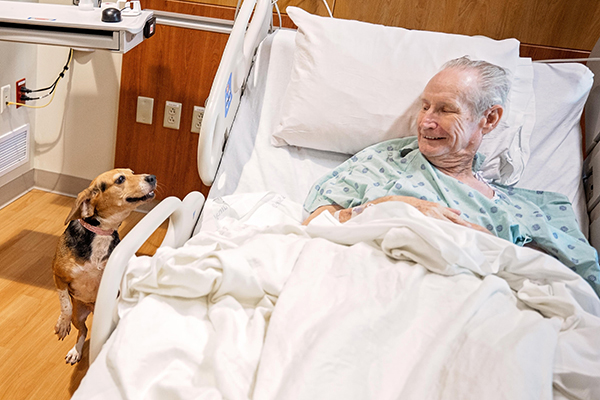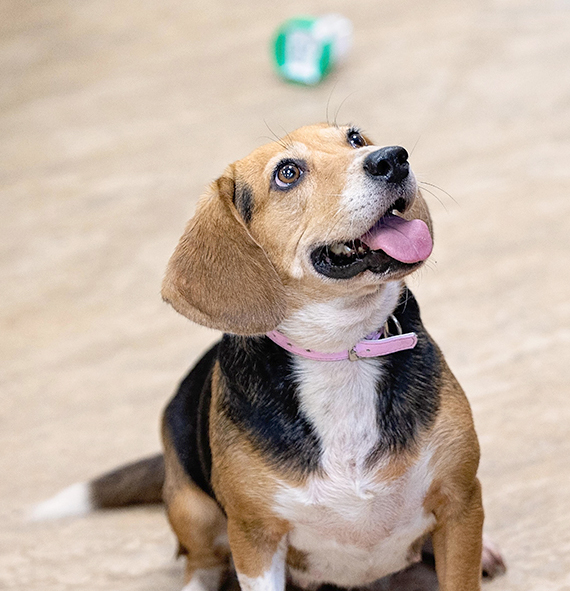Publisher's note: The author of this post, Spaine Stephens, is a contributor to ECU News Services.
Harley and her trainer, Keith Pittman, walk down a hallway in Vidant Medical Center as they demonstrate Harley’s ability to detect C. diff, bacteria that can cause severe illness. | Photos: Cliff Hollis | Video: Rich Klindworth
Harley the beagle refused to run rabbits-a character flaw that left her future uncertain.
Now, the wayward hunting dog has finally found a worthy prey-but not of the woodland variety.
Harley visits Vidant Medical Center in Greenville twice a week to sniff out Clostridioides difficile, more commonly known as C. diff, a bacterium common in health-care settings that can cause severe diarrhea, colitis and other complications.
The 2-year-old dog partners with Dr. Paul Cook, professor of medicine and chief of the Division of Infectious Diseases in the Brody School of Medicine at East Carolina University to identify and eradicate the bacterium. With the support of Vidant Health, the team is going a step further to eradicate the threat of C. diff in the hospital and ensure that patient treatment areas are as safe and sterile as possible.
Harley is assigned to sniff for C. diff spores in rooms, in hallways and on equipment. When she detects the spores, she sits-signaling that she has pinpointed their location, which is then re-cleaned with a bleach agent.
C. diff commonly is spread when people touch surfaces that have been contaminated with fecal matter from an infected person. Harley's ability to identify especially stubborn C. diff spores is routinely on target.
"We have tested her with about 50 different clinical stool specimens, both positive and negative. She has never sat down on a known negative specimen," said Cook, who believes Harley is currently the only dog in the United States sniffing out C. diff in a hospital.
For Vidant Medical Center, which is already ranked among the top quartile in the prevention of infection, deploying Harley is an innovative approach in its relentless pursuit of improving patient outcomes.
"Finding creative solutions to challenging problems is an important part of our mission to improve the health and well-being of eastern North Carolina," said Brian Floyd, president of Vidant Medical Center.
"As an academic medical center, we are uniquely positioned to drive innovation alongside our partner, ECU. We are hopeful that this approach to identifying C. diff will provide a lasting solution and we are happy to support Dr. Cook, Harley and her owners as we collaboratively work toward this goal."
Sniffing out the problem
According to the Mayo Clinic, most C. diff infections occur in people who are or who have recently been in a health care setting - including hospitals, nursing homes and long-term care facilities - where germs spread easily, antibiotic use is common and people are especially vulnerable to infection. In hospitals and nursing homes, C. diff is mainly transmitted on hands from person to person, but also on cart handles, bedrails, bedside tables, toilets, sinks, stethoscopes and thermometers.
C. diff can produce toxins that attack the lining of the intestine. The toxins destroy cells, produce patches (plaques) of inflammatory cells and decaying cellular debris inside the colon and cause watery diarrhea.
According to the Centers for Disease Control, C. diff causes approximately 500,000 illnesses in the United States each year. One in five patients who contract C. diff will experience a recurrence. Within a month of diagnosis of a health care-associated C. diff infection, 1 in 11 cases in people over age 65 are fatal.
Doctors have long searched for answers on how to diminish the threat of this worldwide problem. Cook's research led him to findings from the Netherlands and Canada-where two other dogs successfully and consistently sniffed out C. diff and in turn helped improve patient outcomes.

Dr. Marije K. Bomers' research at the Vrije Universiteit in Amsterdam included the use of Cliff, a beagle, to sniff out C. diff based on the idea that since humans can sometimes detect the scent of the infection, dogs' much more keen sense of smell would be more effective. Cliff's precision and success rate lent hope to the hypothesis, further cemented when he identified C. diff in 25 of 30 infected patients. Cliff recently retired from his duties.
Angus, a springer spaniel, has provided his services for Vancouver Coastal Health in Canada since around the time that dog detection program began in 2016.
"My thought is that if they can teach a dog to sniff C. diff in the Netherlands, we should have somebody in this country that can do the same," Cook said.
Cook contacted colleagues at ECU and Vidant Health to share context and background for the project and explore the possibility of bringing it home. Early in the process, he also reached out to get clearance from ECU's Institutional Animal Care and Use Committee to ensure that Harley is being treated humanely and does not pose a health risk to people. This process has to be renewed on a yearly basis.
The project is backed financially by Vidant Health, Cook said, whose leaders were enthusiastic about an innovative idea that they also found pragmatic.
"By positively identifying areas where C. diff is present, we are able to clean and re-clean rooms, which improves the health and safety of team members and patients," said Dr. Keith Ramsey, chief of infection control for Vidant Medical Center.
"Furthermore, reduced infections mean shorter length of stays and improved experiences for those we serve."
Along with shorter hospital stays and fewer infections, Harley brings other benefits as well, Cook said.
"My feeling is that the project pays for itself and then some by potentially reducing spread of this serious, often life-threatening infection," Cook said.
"And when we come in, everyone wants to see the dog. Everyone wants to pet her."
Dogged determination
Cook reached out to Keith and Laura Pittman of Sniff Us Out, LLC, in Greenville, Harley's owners and trainers. Keith Pittman earned biology and chemistry degrees from ECU in 1987 and worked in ECU's Department of Surgery for 30 years-15 years studying the immunology of transplanted organ rejection and 15 years studying cancer immunology. Cook reached out to him because of his reputation for training dogs and his medical-field experience.
Vidant Medical Center patient Thomas Radford enjoys a visit from Harley the beagle as she checks his room for C. diff spores.
"It is a rewarding experience to combine two of my passions, dog training and science," he said,
"to assist Dr. Cook with the help of Harley's keen sense of smell to locate and remove environmental C. diff spores that could infect other patients."
Laura Pittman is a student in ECU's Master of Arts in English degree program. She and her husband have evaluated different sporting dog breeds to assess their abilities in bomb sniffing for homeland security-an experience that helped them understand the attributes needed for a dog who would sniff out C. diff.
"Keith's understanding of how dogs think and react also assisted in Harley's training," Laura Pittman said.
"His knowledge of dog breeds was the reason that he chose a beagle for the first dog to be trained; they are known to be food-oriented with a high prey drive and a keen sense of smell. Her love for searching and finding C. diff spores and then being rewarded afterwards was a major factor in this type of training."
Keith Pittman said beagles' sense of smell is 300 times greater than a human's, making them able to detect the one scent they want to single out-whether it's bombs, drugs or C. diff. Pittman has seen that skill at work with hunting dogs most of all, but sees this as an opportunity to provide a service in other meaningful ways.
"We never considered that we'd be in a hospital," he said,
"helping keep people from getting sick."
Because of Harley
During a recent shift at Vidant Cancer Care at the Eddie and Jo Allison Smith Tower, Harley bounced down a pristine hallway in a pink collar and a lively mood. A toddler who was part of a visiting family started down the hallway, saw Harley and shrieked,
"Dog!"
Harley responded in kind, baying with joy as the two communicated in their own way-then she turned her attention toward a patient bay. The rest of the team suited up in protective wear, and Keith Pittman gathered Harley's leash in his hand and moved in. Moments later, they emerged.
Vidant Medical Center patient Thomas Radford enjoys a visit from Harley the beagle as she checks his room for C. diff spores.
"She found it on the bedrail, they cleaned it and then she didn't find it again," he said.
"Good dog," a passing nurse called.
"You did good!"
Harley paused for a water break and preened in the praise before moving on toward a virology lab to test and showcase her skills.
"Our favorite visitor!" one lab technician announced.
In addition to the happiness and health benefits she brings to the hospital, Harley has also spurred changes in protocol in equipment sterilization. After she detected C. diff spores on an ultrasound wand used on C. diff-positive patients and the preferred cleaning agents didn't kill C. diff, hospital leaders figured out a new way to eradicate the bacteria without damaging the equipment with bleach agents that are too harsh for the machinery.
"We instituted a policy with our medical director to clean the machine the appropriate way to kill the C. diff spores," said Jarvis Campbell, assistant nurse manager at Vidant Health.
"And we would have never really thought about it if it hadn't been for Harley."
Harley's abilities are anticipated to benefit even more patients in the future.
"We feel fortunate to be asked to be a part of this innovate project to decrease environmental C. diff spores," Keith Pittman said.
"We hope to have more dogs with Harley's abilities. We have always been taught to help others when you can, and we see it as one way we are able to give back to the community."
Brian Wudkwych, external communications specialist for Vidant Health, contributed to this story.




